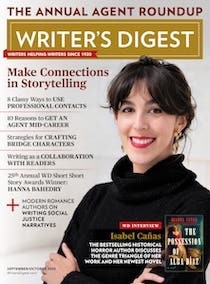7 Things I’ve Learned So Far, by Pamela Sherwood
Outside of personal experience, the best way to learn is to get advice from people who’ve been there and done that. Discover the seven things learned so far by author Pamela Sherwood.
This is a recurring column called “7 Things I’ve Learned So Far,”where writers (this installment written by romance writer Pamela Sherwood) at any stage of their career can talk about writing advice and instruction as well as how they possibly got their book agent -- by sharing seven things they’ve learned along their writing journey that they wish they knew at the beginning.
1. Know when to let go. We’ve all heard about the hazards of sending your manuscript out too soon, before it’s properly polished, edited, etc. It’s also possible to let your fears paralyze you into not sending it out at all. When you start fiddling with your work just to fiddle with it, dithering over the placement of punctuation marks or what not, it’s time to move on to the next stage, find that agent or publisher you want to query, and hit that “SEND” button!
2. Do your homework. There are tons of online and offline resources to help you find agents and editors to handle your work. Take the time to research the most likely prospects, keep a record of their submission policies, and follow their guidelines to the letter when you submit to them. Do the same if they request material from you, and if they send it back with suggestions for revision/improvement, take those suggestions seriously. Even if they ultimately pass on your work, they were interested enough to consider how it might be made better and more saleable. Thank them for their time before you move on.
3. Spread the net wide. Once you have your list of prospects, don’t limit yourself to only your top five “dream literary agents.” The agent who believes in you and your work may be further down the list. Or possibly not even on the list, at first--it’s a good idea to review that list regularly and add or subtract people as you learn more. I know of two agents who closed up shop mere months after they passed on my query. The agent I signed with did not spring immediately to mind when I was making my list, but I took a chance on querying her. She represents me to this day.
Order Waltz with a Stranger by Pamela Sherwood.
4. Don’t over-query ... or under-query. Blind-copying the same query to 50 agents is a bad idea. Take the time to personalize each query letter, show that you’ve done your research, and explain why you think that agent might be interested in your work. On the other hand, don’t restrict yourself to sending out one query and waiting weeks before sending out another. You’ll get quicker results if you write and send a batch of queries at once--I sent out about five at a time, which is still pretty conservative, and found an agent within a year. And if you receive an immediate form rejection, don’t despair--send out another query!
5. Familiarize yourself with social media. If you aren’t already familiar with social media tools like Twitter and Facebook, educate yourself as quickly as possible--especially since most agents and editors will be using those tools too. Likewise, give some thought to what kind of website and/or blog you’d want to have as an author, and then start creating it. Having your website in place will save you a world of time when you do break through to an agent or editor, not to mention how much of an advantage it will give you when you finally sell your book! Be careful and discreet about what you say on social media, though, because it can come back to haunt you. Try not to post or tweet anything that you might have to apologize for later.
6. Never give up. Disappointment happens at every stage of the submission process, and all you can do is roll with the punches. As of this writing, my first novel, which secured me my agent’s representation, is still without a home. I brooded. I moped. I doubted myself and my chances of ever being published. Then I parked my backside in a chair and finished my second book. Waltz with a Stranger sold within three weeks, and will be published on December 4, 2012. My third book, A Song at Twilight, is scheduled to be released in October 2013.
7. Try not to compare yourself to other authors. There will always be someone with a more famous agent, a more prestigious publisher, and a bigger advance. But their success takes nothing away from you and yours. When you land that agent, that offer, or that deal, take the time to celebrate. Laugh, scream, cry, sing, dance, pour yourself a glass of bubbly, treat yourself to a great meal out or some other indulgence. You’ve accomplished something that many writers only dream of, and it’s a victory worth savoring.
Pamela Sherwood is the author of WALTZ WITH A STRANGER(Sourcebooks Casablanca, Dec. 2012), her debut romance, of whichRomantic Times Book Review said, "Readers will be enchanted." Pamelagrew up in a family of teachers and taught college-level literature and writing courses for several years before turning to writing full time. She holds a doctorate in English literature, specializing in the Romantic and Victorian periods, eras that continue to fascinate her and provide her with countless opportunities for virtual time travel. She lives in Southern California. Visit her at pamelasherwood.com.



